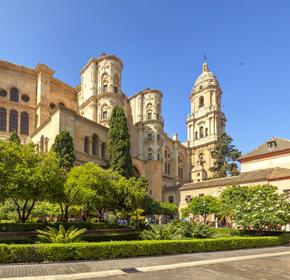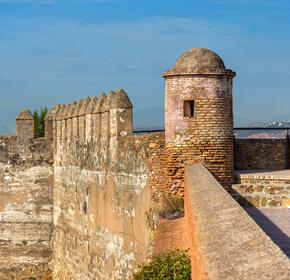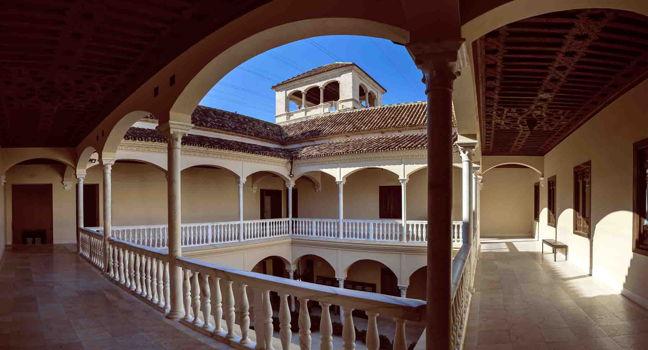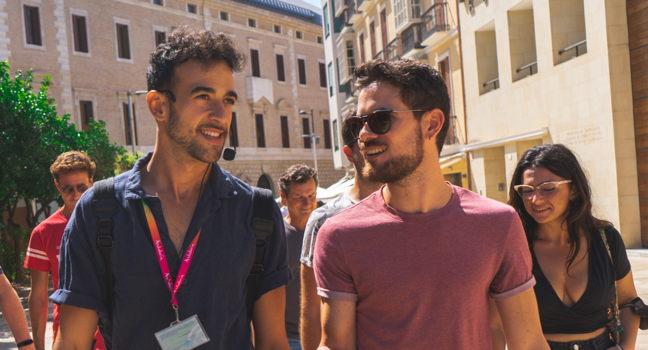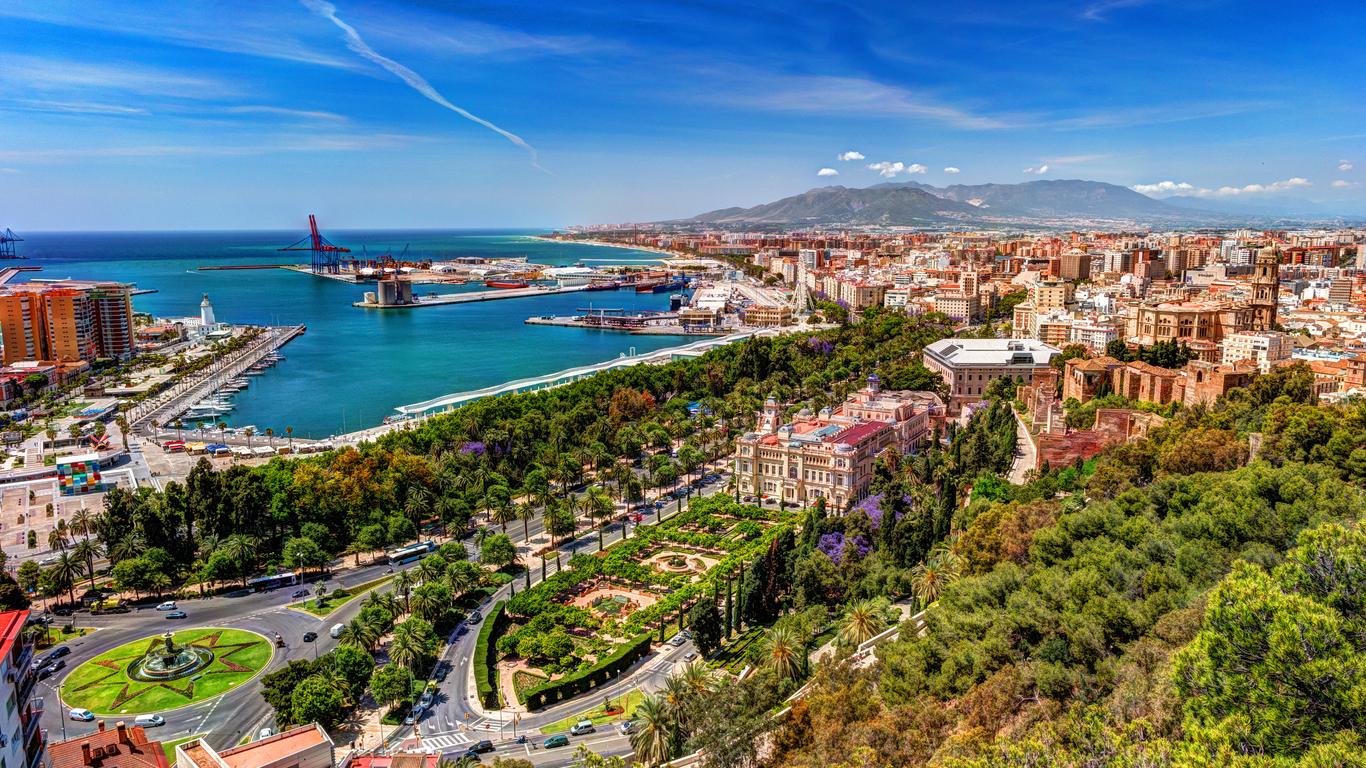
Málaga travel guide
Málaga Tourism | Málaga Guide
You're Going to Love Málaga
Malaga is the largest city on the Costa del Sol and has a history dating back nearly 3,000 years. Founded by the Phoenicians, it is one of the oldest cities in the world and that history can be seen today in the historical center, which is often referred to as an open museum, with ruins from Phoenician, Roman, and Moorish times.
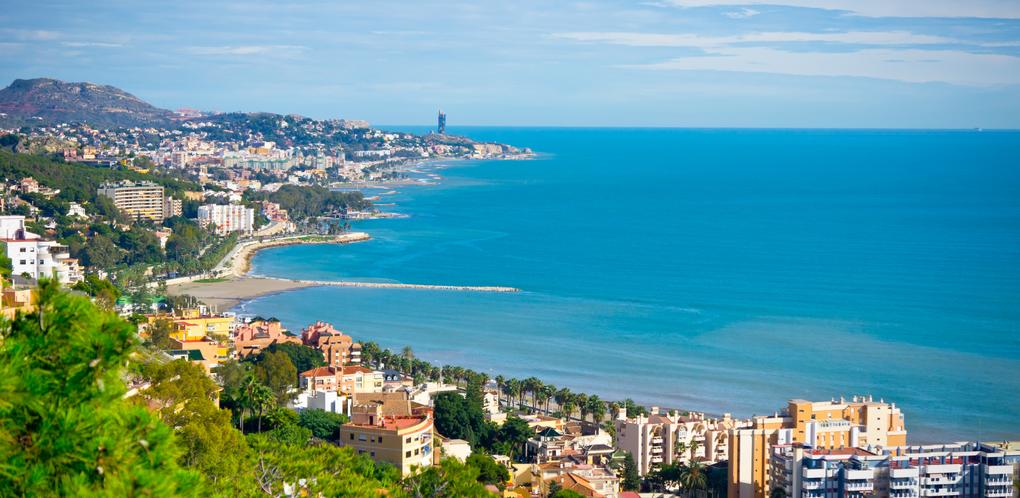
Today, Malaga is one of the most popular tourist destinations in Spain. It combines beaches, history, and archaeology with a vibrant nightlife and important cultural sights. It is also the transport hub for the Costa del Sol and provides an excellent base from which to explore the region.
Malaga has some excellent shopping and delicious cuisine. As the birthplace of Pablo Picasso, it attracts many art lovers and the city boasts a number of fine galleries and museums.
Top 5 Reasons to Visit Málaga
1. Picasso Museum
The Picasso Museum is one of the main tourist attractions in the city. Picasso is one of the most important painters of the 20th century, and you can see exclusive examples of his work and exhibitions that are unavailable elsewhere. Entry is EUR8.00.
2. Alcazaba
The Alcazaba is an 11th-century Moorish castle set on a hill in the middle of the city. It is the best-preserved example in Spain of this era of Moorish forts. It has beautiful gardens and great views out over the city. Entry is EUR2.10.
3. Roman Theater
Beneath the Alcazaba is the Roman Theater, taking you even further back into Malaga's history. Entry is free and you can visit the adjoining building where you can view a film on the site and see some of the artifacts that have been unearthed there.
4. Castillo de Gibralfaro
The Castillo sits on top of a hill in the city and offers more splendid views of Malaga. If you are feeling energetic, it is a fine walk up to the Castillo but there is a bus (number 35) for those who don't wish to walk. Inside, you will find gardens and displays of the various armies that have occupied the fort. Entry is EUR2.10.
5. Kings Walkway
For those who enjoy a more challenging walk, the Kings Walkway is a suspended pathway clinging to the sides of the El Chorro gorge. It is around 50 minutes northwest of Malaga by car.
What to do in Málaga
1. Alcazaba de Málaga: Go Back to Ancient Times
The Andalucian region has seen many conquering groups over its time as an important Naval gateway. Visit the famous palace fortification dating back to the 11th century situated on top of a hill overlooking the city center of Malaga. The citadel was constructed by ancient Arab residents and is the best preserved alcazaba in all of Spain. Here you can peruse well-designed Gardens and see elaborate fountains while learning about the ancient Siege of Malaga in 1487. It is also well situated to visit other city center attractions including The Malaga Cathedral, the Castillo de Gibralfaro and the Picasso Museum.
2. Catedral de Málaga: Yet another unfinished masterpiece!
It seems like Spain is all about unfinished Cathedrals -- from Barcelona's La Sagrada Familia to Granada's Alhambra, every city you visit seems to have one. Malaga is no different, with only one of the two originally designed towers making it to construction thus earning the nickname "the one-armed woman." The exterior of the building was designed using elements of both Gothic and Baroque styles. Inside, the ornate carvings, paintings and exquisite choir halls beg visitors to take a seat among the pews and marvel at their splendor. The Cathedral remains a functioning Roman Catholic church where visitors can listen to organ performances and receive weekly communion.
3. Castillo de Gibralfaro: For History Buffs and Beautiful Views
Located just up the hill from the Alcazaba, the Castillo de Gibralfaro is a former military base used by Arab inhabitants to protect themselves against invasion. There are many ways to reach the summit, but we suggest taking the scenic route via Paseo Don Juan de Temboury, which winds through lush gardens and has many viewpoints overlooking the city. The most impressive part when visiting is surely the sprawling ramparts, which date back to the 10th century and are divided into two sections within the compound. The Interpretation Center can provide visitors with further information about the Arabic influences seen recognized in Spain's architecture and culture, especially in the Andalusian region.
4. Teatro Romano de Málaga: Enjoy an open-air performance
It may not be the Colosseum, but the Roman Theater of Malaga sure does put on a good show! The giant amphitheater was created to honor Augustus Ceaser in 1 A.D. and is the oldest monument in the city of Malaga. After being rediscovered in the 1950s, the historic structure has undergone extensive renovation in order to preserve the city's ancient history. With enough room to seat up to 220 people, the Roman Theater today regularly draws in thousands of visitors who flock there to indulge in the many summer open-air concerts and performances.
5. Jardín Botánico-Histórico La Concepción: Appreciate nature from around the world
Malaga's Mediterranean climate makes it the perfect place to discover the tropical and subtropical species of plants that call Andalusia home. Some of the most popular exhibitions at the Historic Botanical Garden include the rock garden of biodiversity, the fruit tree collection and the aquatic plant collection. There is also an imaginary 'around the world in 80 trees' tour in which you can see plants, trees and bushes from five different continents on display.
6. Mosque–Cathedral of Córdoba: Blending Catholic and Muslim Theologies
Built in 1523, the Mosque-Cathedral of Córdoba was once the meeting place for Córdoba's most powerful. The cathedral was erected in the center of a mosque and mahogany choir stalls carved with scenes from the Bible were embedded. Visit the choir stalls and take in their beauty. You'll be amazed by the diverse architecture made from Islamic, Gothic, and Moorish themes. Stroll over to the Mezquita flanked alongside one of marble columns that support the church. Housed throughout the mosque-cathedral are a myriad of entrances and chapels. Visit the Parroquia del Sagrario Chapel and admire its three naves or venture the cathedral's western halls and admire the Holy Supper by Juan de Ortuño. This breathtaking painting is located at the altarpiece of the Chapel of Santa Ana. Alongside the Holy Supper you'll see five elaborate oil canvases by Pablo de Céspedes.
7. Alhambra: Palace of Flowers
A palace, fortress and citadel in one, this sprawling complex has overlooked Granada for centuries and continues to be one of the greatest historical wonders in the world. Exceptional carvings and tile work cover every inch of wall and ceiling, while courtyards with water features open up to sunny skies. Surrounding these rooms of royalty are equally spectacular gardens, the placement of flowers perfectly in tune with the architecture.
8. Alcázar de los Reyes Cristianos: Site of the Courts of the Holy Offices
Adjacent to the Guadalquivir river sits the Alcazar castle, once the home of King Fernando and Isabella. As you walk through the palace, visit the room where Christopher Columbus proposed his intention to reach India by sailing via a western route. Stroll to the downstairs gallery where Moorish, Catholic, and Roman artifacts are displayed and admire their cultural diversity. If you love heights, climb Torre de Los Leones and take in an aerial view of Córdoba's pictorial countryside. After a tour of the castle, relax by the Moorish styled gardens and admire the Arabic-influenced architecture.




1. Alcazaba de Málaga: Go Back to Ancient Times
The Andalucian region has seen many conquering groups over its time as an important Naval gateway. Visit the famous palace fortification dating back to the 11th century situated on top of a hill overlooking the city center of Malaga. The citadel was constructed by ancient Arab residents and is the best preserved alcazaba in all of Spain. Here you can peruse well-designed Gardens and see elaborate fountains while learning about the ancient Siege of Malaga in 1487. It is also well situated to visit other city center attractions including The Malaga Cathedral, the Castillo de Gibralfaro and the Picasso Museum.
2. Catedral de Málaga: Yet another unfinished masterpiece!
It seems like Spain is all about unfinished Cathedrals -- from Barcelona's La Sagrada Familia to Granada's Alhambra, every city you visit seems to have one. Malaga is no different, with only one of the two originally designed towers making it to construction thus earning the nickname "the one-armed woman." The exterior of the building was designed using elements of both Gothic and Baroque styles. Inside, the ornate carvings, paintings and exquisite choir halls beg visitors to take a seat among the pews and marvel at their splendor. The Cathedral remains a functioning Roman Catholic church where visitors can listen to organ performances and receive weekly communion.
3. Castillo de Gibralfaro: For History Buffs and Beautiful Views
Located just up the hill from the Alcazaba, the Castillo de Gibralfaro is a former military base used by Arab inhabitants to protect themselves against invasion. There are many ways to reach the summit, but we suggest taking the scenic route via Paseo Don Juan de Temboury, which winds through lush gardens and has many viewpoints overlooking the city. The most impressive part when visiting is surely the sprawling ramparts, which date back to the 10th century and are divided into two sections within the compound. The Interpretation Center can provide visitors with further information about the Arabic influences seen recognized in Spain's architecture and culture, especially in the Andalusian region.
4. Teatro Romano de Málaga: Enjoy an open-air performance
It may not be the Colosseum, but the Roman Theater of Malaga sure does put on a good show! The giant amphitheater was created to honor Augustus Ceaser in 1 A.D. and is the oldest monument in the city of Malaga. After being rediscovered in the 1950s, the historic structure has undergone extensive renovation in order to preserve the city's ancient history. With enough room to seat up to 220 people, the Roman Theater today regularly draws in thousands of visitors who flock there to indulge in the many summer open-air concerts and performances.
5. Jardín Botánico-Histórico La Concepción: Appreciate nature from around the world
Malaga's Mediterranean climate makes it the perfect place to discover the tropical and subtropical species of plants that call Andalusia home. Some of the most popular exhibitions at the Historic Botanical Garden include the rock garden of biodiversity, the fruit tree collection and the aquatic plant collection. There is also an imaginary 'around the world in 80 trees' tour in which you can see plants, trees and bushes from five different continents on display.
6. Mosque–Cathedral of Córdoba: Blending Catholic and Muslim Theologies
Built in 1523, the Mosque-Cathedral of Córdoba was once the meeting place for Córdoba's most powerful. The cathedral was erected in the center of a mosque and mahogany choir stalls carved with scenes from the Bible were embedded. Visit the choir stalls and take in their beauty. You'll be amazed by the diverse architecture made from Islamic, Gothic, and Moorish themes. Stroll over to the Mezquita flanked alongside one of marble columns that support the church. Housed throughout the mosque-cathedral are a myriad of entrances and chapels. Visit the Parroquia del Sagrario Chapel and admire its three naves or venture the cathedral's western halls and admire the Holy Supper by Juan de Ortuño. This breathtaking painting is located at the altarpiece of the Chapel of Santa Ana. Alongside the Holy Supper you'll see five elaborate oil canvases by Pablo de Céspedes.
7. Alhambra: Palace of Flowers
A palace, fortress and citadel in one, this sprawling complex has overlooked Granada for centuries and continues to be one of the greatest historical wonders in the world. Exceptional carvings and tile work cover every inch of wall and ceiling, while courtyards with water features open up to sunny skies. Surrounding these rooms of royalty are equally spectacular gardens, the placement of flowers perfectly in tune with the architecture.
8. Alcázar de los Reyes Cristianos: Site of the Courts of the Holy Offices
Adjacent to the Guadalquivir river sits the Alcazar castle, once the home of King Fernando and Isabella. As you walk through the palace, visit the room where Christopher Columbus proposed his intention to reach India by sailing via a western route. Stroll to the downstairs gallery where Moorish, Catholic, and Roman artifacts are displayed and admire their cultural diversity. If you love heights, climb Torre de Los Leones and take in an aerial view of Córdoba's pictorial countryside. After a tour of the castle, relax by the Moorish styled gardens and admire the Arabic-influenced architecture.




Where to Eat in Málaga
The beachfront restaurants are known as chiringuitos and offer dishes such as paella, seafood, and fish. You can try the local specialty, espetos, which consists of skewered sardines. The port is another area with good restaurants. Las Garrafas is a good, simple, and traditional restaurant, while Restaurante Gallego Candamil is a popular Galician restaurant. Expect to pay around EUR7.75 for a dish in a budget restaurant and EUR30.00 for a three course meal in a mid-range restaurant.
When to visit Málaga
Summer is undoubtedly the peak tourist season for Malaga. Temperatures can reach 95 degrees Fahrenheit but breezes from the Mediterranean Sea provide some comfort. Malaga has the warmest winter temperatures of any major European city, with average temperatures in December of around 64 degrees Fahrenheit. Spring and fall are warm and dry and the main sights tend to be quieter. Most rain falls in winter but even then it rarely lasts long.
How to Get to Málaga
Plane
Malaga Airport (AGP) is about five miles southwest of town. It has very good connections across Europe and in summer there are direct flights to New York City, Montreal, and Toronto. The airport is extremely well connected to the city center by bus and train. Bus A leaves every 30 minutes and costs EUR3.00. The train leaves from the stations outside terminal 3. It runs every 20 minutes and takes just 12 minutes. The fare is EUR1.80. Taxis into the city center cost around EUR20.00
Train
Malaga is served by an excellent train network. The main station is María Zambrano, less than a mile to the west of the city center. High-speed trains will take you to Cordoba in an hour, Seville in two hours, and Madrid in under three hours. There are also frequent services to regional destinations, like Granada, Torremolinos, and Fuengirola.
Car
Spain's motorway network is modern and efficient. The main route across the Costa Del Sol is the A-7/E-15, which runs west to Gibraltar and northeast up the coast all the way to Valencia. The A-45 is the main road to Cordoba.
Bus
You will find the main bus station on the Paseo de los Tilos, next to the train station. It is the hub for services that run to virtually all major cities in Spain. The Muelle de Heredia bus station on Avenida de Manuel Agustin Heredia is a smaller station serving local routes like the nearby beach towns along the coast.
Airlines serving Málaga
Where to stay in Málaga
The main areas for tourist accommodation in Malaga are along the beach or around the pedestrian zone in the city center. A good budget option is the Hostal La Palma. Room Mate Valeria is centrally located with a lovely rooftop bar and stylish rooms. The Parador de Malaga Gibralfaro also has stunning views and comfortable rooms.
Popular Neighborhoods in Malaga
The Old Town - this is the city's historic center, its main street lined with 19th-century buildings and full of cafes, bars, boutiques, and galleries. The area is home to the Cathedral, the Alcazaba, and the Museo del Patrimonio.
Los Montes - this is one of the most beautiful quarters in the city. It has spectacular views and lots of affordable accommodation. It is also a good area to find traditional restaurants and bars, and is home to the Parque Natural de Montes de Malaga.
The Beachfront - the beach runs for miles on either side of the port, much of which is covered by the Paseo Maritimo Antonio Machado promenade. La Malagueta is a popular city center beach backed by shops, bars, and restaurants.
Where to stay in popular areas of Málaga
Most booked hotels in Málaga
How to Get Around Málaga
Public Transportation
Buses provide the main form of public transport around Malaga. The two main providers are the urban bus Empresa Malaguena de Transportes network and the Malaga Metropolitan Consorcio de Transporte Metropolitano del Area de Malaga line. A single journey costs from EUR1.30 and a 10-journey ticket is EUR8.30. There are also two commuter train lines, the light rail system and the Cercanías.
Taxi
Taxis are a popular and relatively affordable way to get around Malaga. The starting fare is EUR2.65 and you will then pay around EUR3.00 per mile.
Car
Malaga is reasonably easy to drive around outside the central pedestrian areas. Car rental companies include Europcar and Sixt, prices are around EUR50.00 per day, and it is a good way to explore the surrounding countryside.
The Cost of Living in Málaga
Shopping Streets
Calle Marqués de Larios is a lovely pedestrian shopping area in the city. Other main shopping streets are Calle Larios and Calle Nueva. All the major stores are here, including the El Corte Inglés department store and lots of designer brands. You can shop for fashion, shoes, jewelry, and accessories, along with some lovely artisan cheese and other products.
Groceries and Other
A quart of milk will cost around EUR0.76 and 12 eggs EUR1.83. Major supermarkets in Malaga include Eroski and Supermercado El Rocio.
